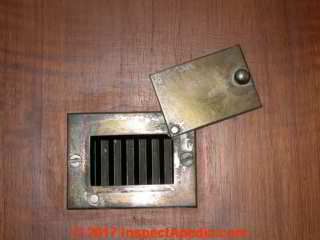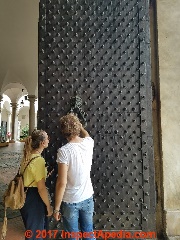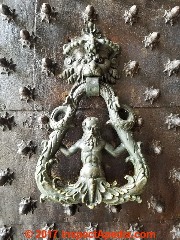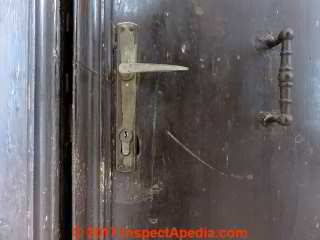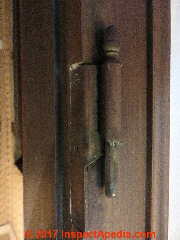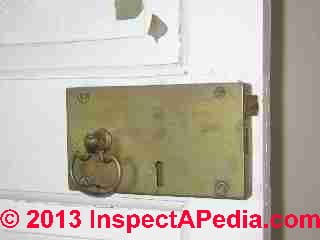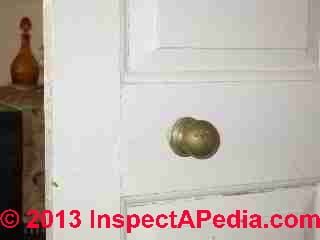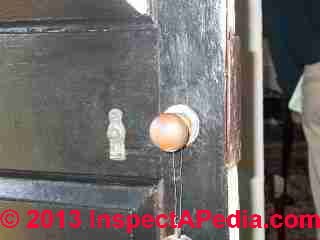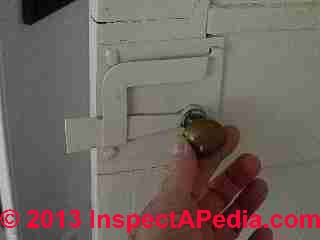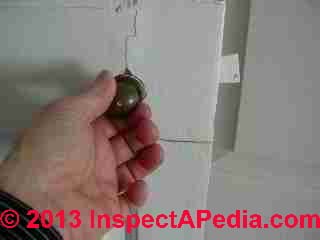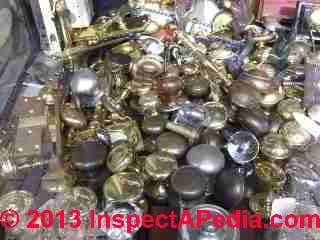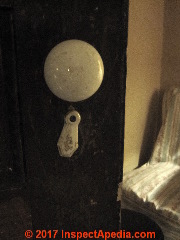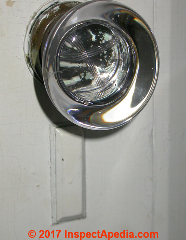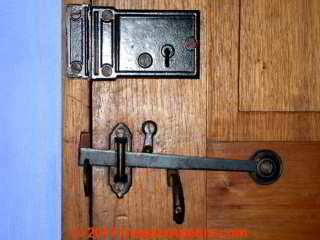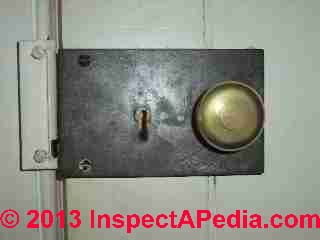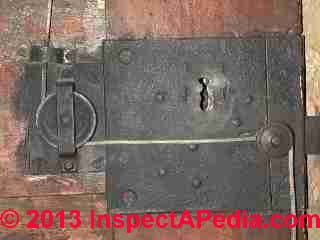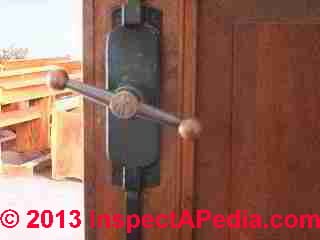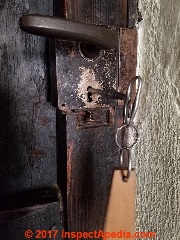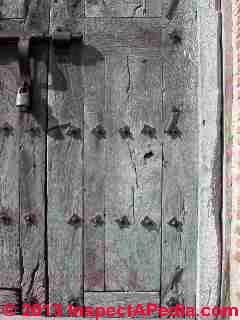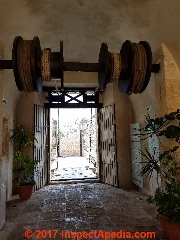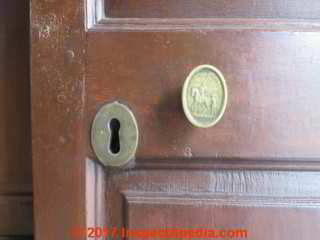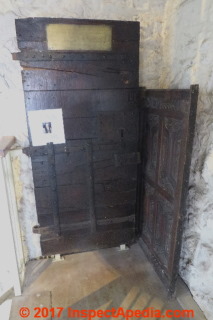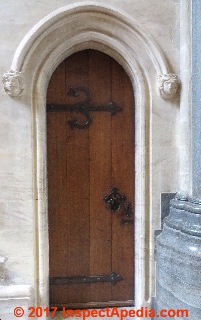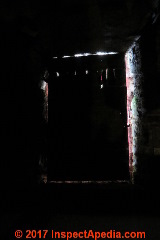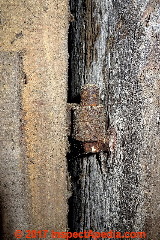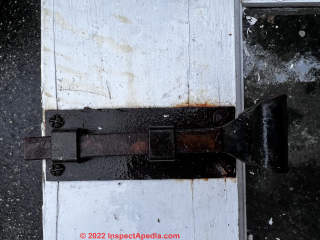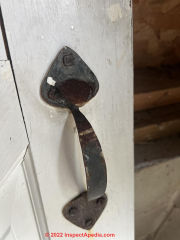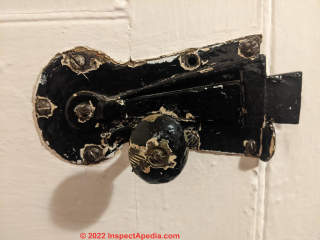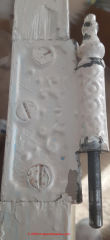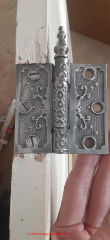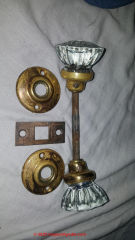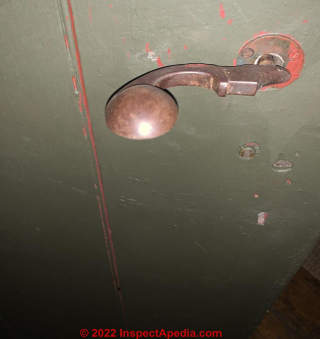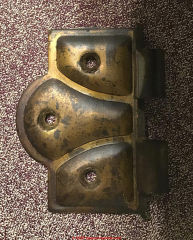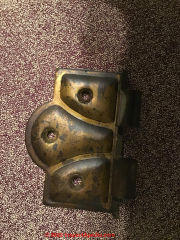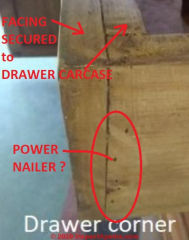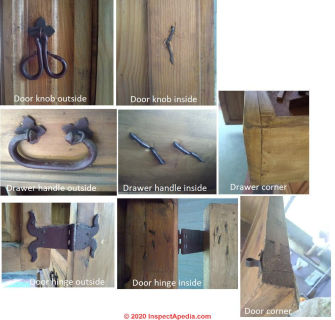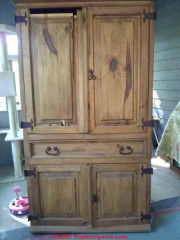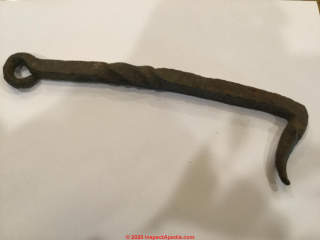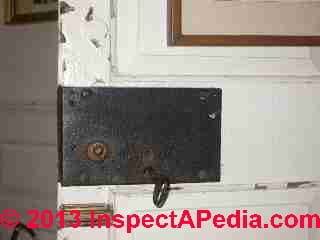 Door Age: Door Locks, Knobs, Hinges
Door Age: Door Locks, Knobs, Hinges
Hardware as Indicators of Building Age
- POST a QUESTION or COMMENT about determining building age by examining its hardware
Building door & door hardware age:
Door & window hardware, knobs, latches, hinges, & screws & nails observed on historic and other older buildings in Argentina, Australia, Italy, New Zealand, the United States, Spain, the U.K.and other countries.
This article describes and illustrates antique & modern hardware: door knobs, latches, hinges, window latches, hardware, nails & screws can help determine a building's age by noting how those parts were fabricated: by hand, by machine, by later generations of machine.
InspectAPedia tolerates no conflicts of interest. We have no relationship with advertisers, products, or services discussed at this website.
- Daniel Friedman, Publisher/Editor/Author - See WHO ARE WE?
Hardware Age: Door Locks, Knobs, Hinges & Nails or Screws as Indicators of Building Age
Door Hardware: latches, knobs, hinges, key covers, keys, and fastening hardware as well as other door construction details may all be indicators of building age.
Here we provide a photo gallery and comments about door hardware from various countries, and where possible we include dates and historical information.
[Click to enlarge any image]
Photos above: this brass door viewing opening in Buenos Aires, Argentina, permits the occupants to inspect the caller before deciding whether or not to open the door.
Antique Door Hardware in Genoa & Venice
Above and below: a studded iron door and ornate cast brass door knocker from a palacio in Genoa's Centro Storico, Genoa Italy.
Below, a more-modern keyed door lock and an antique door pull on a door at the Palacio Pisani in Venice, Genoa's historic enemy.
Our second door photo below shows an elegantly-simple self-closing door hinge at a door in the Palacio Brandolini Rota, also in Venice. This hinge uses the weight of the door to swing the door shut.
Clicking any of the photos at this website will display a larger, higher resolution image.
United States: Suffolk Resolves House Door Hardware
Above is door hardware from the Suffolk Resolves house at 1370 Canton Ave. in in Milton, Massachusetts in the U.S. and dating from 1774.
This door uses lock hardware and a brass turn handle and key opening.
Notice in both the door hardware photos above and those shown below that unlike contemporary passage door locksets, the knob setback distance from the door edge is considerably greater.
Above and below are more examples of door hardware from the 1774 Suffolk Resolves house.
Below are a collection of antique door knobs in a shop in Boston's Boylston area and a ceramic door knob and ceramic keyhole cover from Locust Grove, an Italinate villa built in Poughkeepsie, NY for Samuel Morse in 1851.
Below: a glass door knob and painted-over, originally steel keyhole cover at the 1840 Justin Smith Morrill homestead house in Strafford, Vermont. More hardware from this home is
Our second photo (below) of door latch and locking hardware, also from the Justin Smith Morrill house most-likely date from two different epochs, with the cast-iron locking door latch added later.
Simple Cast Brass & Iron Door Knob & Lock, Hyde Park NY
At above left is an interior passage door lock and door knob from a Hyde Park New York home built ca 1880.
Antique Door Hardware: Barcelona Spain
At above left is a string-operated entry door latch installed at the main floor entrance of an apartment building in the Barri Gotic in Barcelona, Spain.
We estimate that this hardware may be more than 150 years old. The string permits occupants of any of the four floors of the building to open the entry door without having to descend the stairs.
Antique Doors in Mexico
The door shown in our first photo above is installed in Tlaxcala Mexico entering a hacienda that was constructed for Cortes.
We estimate that the door and its hardware date from the 1850's. Our second photo above illustrates a lock and key in a hotel in Real de Catorce, Mexico.
This building, originally used to store silver mined from the surrounding hills of this once secret and difficult to access village, now functions as a hotel.
Below is a clinched-nail and studded exterior door using hand-wrought fasteners at el Charco, in San Miguel de Allende, Guanajuato, Mexico.
Below: in addition to barred iron inner doors with a brass lock, this doorway in Campeche, Yucatan, Mexico, relied on a working drawbridge for security.
Antique Doors & Door Hardware in the U.K.
Above, Cast brass door pull and brass door lock keyhole cover from a London home in the U.K.
Below, in the Saxon Tower in Oxford one finds this historic door that was the entrance to the Bocardo Prison cell from which Archbishop Thomas Crammer and Bishops Hugh Latimer and Nicholas Ridley, the Oxford Martyrs were led to their death by being burned at the stake in 155 and 1556.
The Oxford Martyrs refused to embrace English Queen Mary Tudor's Roman Catholic faith. The second photo below illustrates massive strap hinges on a London church side-door.
Below: door details from Brinstone Farm, St. Weonards, Herefordshire U.K. Buildings in this area date from the 1600's.
The simple farmhouse basement door and hinge shown below has served for at least 200 years. [Click to enlarge any image]
History of Door Hardware in Australia
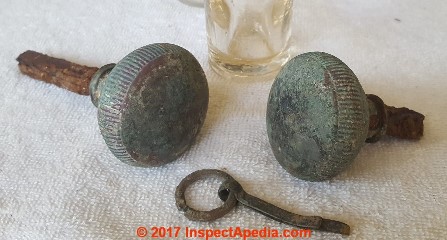 Question: how old is this door hardware from Brisbane?
Question: how old is this door hardware from Brisbane?
Hopefully you can help me, or know someone who can, date my door knobs please.
See photo attached. [Click to enlarge any image]
I've dug up two door knobs on the site here in Australia where a house was built in the 1870s, it was replaced by another house in 1936, but pretty much it's the original site.
Is there any way that I can tell how old they are please?
Any help that you can give is greatly appreciated. - Anonymous by private email 2017/11/17
Brisbane, Australia
Reply:
Your door knob handles appear to be cast (metal poured into a mould), possibly of brass. The square cross-section knob shaft, now badly rusted and exfoliating, looks like iron. The round ring and cotter key look to me to have been fabricated out of iron and possibly copper or brass (for the pin).
I think I see hand-wrought components. If that's the case and if you were in North America these knobs could certainly be early eighteen-hundreds or older. In other countries such as Australia the age at which hand-wrought rings and cotter pins as well as cast iron doorknobs were in common production would be a bit later.
Reader follow-up:
The site the door knobs were founds was the site in Brisbane, Australia, of the original 1870s house that was replaced in 1936 by another house, which is the only indication that I have of the ages.
When you say hand-wrought components, what components are they please, what do you mean?
Reply:
Take a look at the round ring and cotter pin in your photo - to me it looks as if those may be hand -made. Look for hammer marks and surface or shape irregularities (beyond those ascribed to rust or corrosion or usage-wear) that may be from having been worked by hand tools such as a hammer.
You can see similar examples
at NAILS & HARDWARE, AGE, TYPES where I look at machine-made vs. hand-wrought nails.
Machine made rings or cotter pins were made from round wire. Hand made rings and cotter pins were, like nails, made from a rod forged by a blacksmith, then cut off, hammered to dimension, cut to size and for a ring, probably bent around an existing round standard.
History of Iron work in Australia
A review of the history of iron work in Australia can be informative in understanding what form of metal objects might have appeared in different decades. These are resources of interest:
- Southern, J.L.N., HISTORY OF IRON SMELTING IN AUSTRALIA [PDF] University of Wollongong, New South Wales, Australia, Email: research-pubs@uow.edu.au retrieved 2017/11/27, original source: http://ro.uow.edu.au/cgi/viewcontent.cgi?article=1725&context=ihsbulletin
- Christon, Ray, "Fitzroy Iron Works Mittagong" High Ground Consulting, 116 Hassans Walls Road, Lithgow NSW 2790, (02) 6353 1812, for Fabcot Pty Ltd., retrieved 2017/11/27, original source: http://www.higround.com.au/docs/THFitzRoy.pdf
- Day, L., "A selective History of the Fitz Roy Iron Works, Nattai (later Mittagong) from 1848 to 2006 (2006)
- Bill Wallis, "The Architecture of Door Hardware in Australia" [PDF] Zanda Architectural Hardware, Perth (Head Office) 7 Bellows Street, Welshpool WA 6106 Australia, Email: sales@zanda.com.au, Tel: 1300 926 321 Zanda Press, website: www.zanda.com.au, retrieved 2017/11/26, original source: http://www.zanda.com.au/wp-content/uploads/2016/09/The-Architecture-of-Door-Hardware-v-12.pdf
This article notes that "Cast metal knobs were introduced around 1846.", - Restoration Online
PO Box 26 Mt Victoria
NSW 2786 Australia Tel: 02 6355 2003 Email: sales@esalesgroup.com.au Website: http://www.restorationonline.com.au/handles/door-handles
Antique door hardware for restoration projects in Australia Website - Wells, Kathryn, Historic Australian Houses - living museums - (website) (2013) http://www.australia.gov.au/about-australia/australian-story/historic-austn-houses might give access to someone who can specifically place your door knob.
Of course many door knobs and other door hardware were made of a range of materials including brass, bronze, china, copper, glass, wood, and later stainless steel and aluminum as well as zinc alloys.
Also try your own review of other search results for "history of iron work in Australia" and "history of metal work in Australia" - findings that are helpful .
But remember that the appearance of new technology across a huge continent is never simultaneous nor uniform. In North America in their outback (out-west) people were still forging nails by hand well after machine made nails were appearing in the Northeast.
There is also some evidence that Australia had some metalworking going on before the arrival of Europeans, though that would not of course be likely to pertain to the door knobs in your photos.
Readers are welcome to use the page to or bottom CONTACT link or Comments Box to post observations and photographs about the age of these Brisbane Australia door parts or other antique or historic door hardware.
Door Repair, Restoration & Door Manufacturers
 The (perhaps originally) water-tight round antique door shown in this photograph is in a Russian B-39 foxtrot-class diesel-electric submarine now docked as part of San Diego's naval museum. San Diego, California. These subs served the Soviet Union between 1958 and 1984.
The (perhaps originally) water-tight round antique door shown in this photograph is in a Russian B-39 foxtrot-class diesel-electric submarine now docked as part of San Diego's naval museum. San Diego, California. These subs served the Soviet Union between 1958 and 1984.
More components of this submarine can be found
at MARINE TOILETS and
- Benchmark Entry Systems (division of Therma-Tru Doors) www.benchmarkdoors.com Steel and fiberglass entry doors
- Halda, Bonnie J., A.I.A. HISTORIC GARAGE & CARRIAGE DOORS: REHABILATION SOLUTIONS [PDF] Preservation Tech Notes, Doors No. 1, U.S. NPS, Technical Preservation Services, retrieved 2022/10/10, original source: https://www.nps.gov/tps/how-to-preserve/tech-notes/Tech-Notes-Doors01.pdf
Restoration of garage & carriage doors at the Mountain View Motel in Ogden Utah, Monte Vista Fire Station in Albuquerque, New Mexico, & the Burgess Carriage House in Ellicott City, Maryland..
Excerpt:
Carriage and garage doors that contribute to the character of a building should be retained whenever possible. Alterations should be undertaken only when necessary and all work should be done in a sensitive manner. - Jeld-Wen Windows and Doors www.jeld-wen.com Wood, wood composite wood, fiberglass, and steel entry doors
- Kolbe Windows and Doors www.kolbe-kolbe.com Wood, steel, and fiberglass entry doors with LVL core and optional extruded-aluminum cladding on frame
- Lamson-Taylor Custom Doors and Millwork www.lamsontaylor.com Custom pine and hardwood entry doors with foam insulation core
- Masonite Corp. www.masonite.com Steel, wood-edged steel, and fiberglass entry doors
- Peachtree Doors and Windows www.peach99.com Steel and smooth and textured fiberglass entry doors
- Pella Windows and Doors www.pella.com Fiberglass and steel entry doors
- Phoenix Door Manufacturing Company www.phoenixdoor.com Softwood and hardwood entry doors up to 8 ft. high and custom designs
- Randall, Chad, REPAIR & REPRODUCTION of PRISMATIC GLASS TRANSOMS [PDF] (2001) Preservation Tech Notes, U.S. NPS, Historic Glass No. 1, retrieved 2022/10/10, original source: https://www.nps.gov/tps/how-to-preserve/tech-notes/Tech-Notes-Glass01.pdf
- Restoration Online PO Box 26 Mt Victoria NSW 2786 Australia Tel: 02 6355 2003 Email: sales@esalesgroup.com.au Website: http://www.restorationonline.com.au/handles/door-handles
- Simpson Door Company www.simpsondoor.com Douglas-fir, hemlock, oak, and mahogany entrance doors, including custom doors; also primed MDF, particleboard, and composite wood doors
- Stanley Door Systems (division of Masonite) www.stanleyworks.com Steel and fiberglass entry doors
- Weathershield Windows and Doors www.weathershield.com Wood and steel entry doors, with wood, vinyl, aluminum clad, and vinyl-clad frames
- Taylor Building Products www.taylordoor.com Steel (stainable finish) and fiberglass entry doors
- Therma-Tru Doors www.thermatru.com Steel and fiberglass entry doors with optional vinyl-clad jambs
Photos of antique & unusual door & door hardware components with age dating details are most welcome. Post a comment and photo at the end of this page.
...
Reader Comments, Questions & Answers About The Article Above
Below you will find questions and answers previously posted on this page at its page bottom reader comment box.
Reader Q&A - also see RECOMMENDED ARTICLES & FAQs
On 2022-07-10 by InspectApedia-911 (mod)
@Hannah,
Oh yes we've looked at a lot of houses and Hardware Cape May New Jersey. It's a great area. And great for birding.
The question of historically valuable Hardware would be better supported if we knew something about the building itself and its history.
Especially there are some very old houses in Cape may. The Colonial House built byMemuchan Hughes is probably from 1775.
Use the on-page search box to find our article titled
How to determine the age of a house
You will see a series of articles on clues that help you guess the age of wood beams and boards, building hardware, Etc.
On 2022-07-09 by Hannah
@InspectApedia-911,
So sorry! Duh! I am from the USA, state: New Jersey. I live in Cape May county, the southern most part of New Jersey, very historical area with lots of maritime history. Bummer to hear it’s probably not historical. Thank you so much for the quick response !
On 2022-07-09 by InspectApedia-911 (mod) - interesting screws may help date door hardware
@Hannah,
That latch actually looks older than the pull handle.
The screws however are interesting. They have a flat slot cut in two directions across the screw head, in a design that could be a precursor to the Phillips head screws invented by J P Thompson in the US in 1933, sold to the Phillips Screw Company who brought the Phillips head screw to the market 3 years later in 1936.
The true Phillips head screws of today don't have a simple flat cross slot but rather the cross is cut on an angle such that pressing down with the Philips screwdriver uses downward for us as well as turning torque to turn the screw.
So the screws in your photo may be a precursor of that design, though the two are certainly not mutually exclusive. We still see some screws on the market that have a flat cross cut slot in two directions across the screw head
On 2022-07-09 by Hannah
Here is another photo of my Dutch door hardware…
On 2022-07-09 by InspectApedia-911 (mod)
@Hannah,
As a general tip when asking us to guess the age of something it would be very helpful to provide context such as the country and city of location of the building and the building age.
Those can often provide a sanity check on otherwise Wild guesses when we can't see enough factual data or detailed clues.
The square headed screws with the clean slot across look modern to me, probably less than 50 years old. This looks like a simple piece of flat strap iron machine cut into a door handle.
On 2022-07-09 by Hannah
I just trashed picked this Dutch door. Looks old based on the hardware. I’m looking to refinish it and use it as an interior door in my house. Any help is appreciated with how old it might be?
On 2022-02-18 by Inspectapedia Com Moderator - antique door latch
@Warren J Greving,
With such heavy paint I can't see tool marks so don't have a definite opinion about the age of the door latch. You might try backing out one of the screws and taking a close look at how the threads are cut and how the head and Slot is designed.
What's most useful is to put the specific piece of Hardware also into the context of the age of the building and what you know about it as that sets bounds on a possible date. For example of that door latches original equipment in your home was built in 1925 that would an approximate date on the latch itself.
On 2022-02-18 by Warren J Greving
Looking to identify this antique door latch
On 2022-02-17 by Alan Jenkins - beautiful Victorian era hinge with paint layers
@Inspectapedia Com Moderator, @Alan Jenkins Feb 15,2022, shows how much paint was on hinges
On 2022-02-16 Alan Jenkins
@Inspectapedia Com Moderator, thank you
I'm in US. Bancroft, Mi
On 2022-02-16 by Inspectapedia Com Moderator - beautiful Victorian era hinge
@Alan Jenkins Feb 15,2022,
That's a beautiful Victorian era hinge - nicer than others I've seen. We'll be sure to keep it with this article.
Please add the country and city of location of the home, and if you find its precise year of construction that'd be useful too.
On 2022-02-16 by Alan Jenkins Feb 15,2022
Took 3 coats of paint off these hinges today. Have lived here 30 years. Was told this part of house was built 1800s
On 2020-10-27 by danjoefriedman (mod)
Typically we see that sort of Hardware in the 1940s and 50s possibly a bit older
On 2020-10-27 by David Boyer
Just wanting info age of door knob it looks old but looks can be deceiving I know modern door knob aren't like this though this seems to be more heavy duty but I'm pretty sure it's probably pretty common door knob
On 2020-09-18 by Jenni - Moravian door hardware Hope New Jersey
I have an early 1800s, possibly late 1700s house in the Moravian village of Hope, NJ. Not sure if the hardware is Moravian but have been told it is. Our “front door” hardware on what would be the earliest part of the house is the most interesting. Attached image below. Would love to hear thoughts on it, I haven’t seen similar.
On 2020-07-25 by danjoefriedman (mod) - Waco Texas pre-1911 door hinge
Anna: I straightened and lightened your image - below.
Try using that for a Google Image Search being sure to indicate that it's a door hinge.
Let me know what you find.
On 2020-07-25 by Anna
I’m trying to find out the age of my house. My neighbor says he has a picture of my house from 1911 and that it wasn’t new then. I have these hinges al through my house. There are no manufacturers markings at all.
This is in the Waco Texas area.
On 2020-04-16 - by (mod) - Rustic Armoire, made in Mexico, not antique
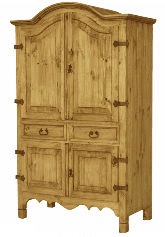 Thank you for searching for similar hardware and furniture online. Shown here is a "rustic armoire" made in Mexico and advertised at San Carlos imports at
Thank you for searching for similar hardware and furniture online. Shown here is a "rustic armoire" made in Mexico and advertised at San Carlos imports at
https://www.sancarlosimports.com/hacar.html
It's not an exact match but it's quite similar to your original photo.
Found in this collection
https://www.sancarlosimports.com/armoires.html
[Click to enlarge any image]
On 2020-04-16 by Barbara
Oh, definitely not disappointed in the results. I'm more than pleased!
I found some furniture on the San Carlos Imports website that have the exact same hinges and knobs and style inside with the unique way to adjust a shelf but their knobs weren't attached the same way with the clinched fasteners. But at least I found the same furniture otherwise..thanks to you!
On 2020-04-15 - by (mod) -
I was glad to assist BarbaraWorking together we both learn. I hope you're not too disappointed in the result: this is modern furniture (in poor condition) not an antique.
On 2020-04-15 by Barbara
Wow! That's great information! I truly appreciate all of your time you gave into looking at this. Many MANY thanks!
On 2020-04-16 - nails, sander marks, construction point to modern-constructed rustic furniture
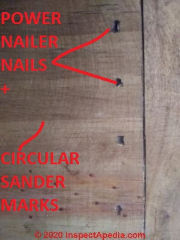 Yep. Excellent, Barbara.
Yep. Excellent, Barbara.
In the closeup I see
1. small rectangular-headed nails that were shot into the wood using a modern power-nailer
2. circular sanding marks made by an electrically-driven power sander
3. those regular dots in the heartwood near the bottom of the drawer side might be left by modern lumber handling equipment
[Click to enlarge any image]
Although one might find modern hardware, glues, nails, fasteners, used to repair or restore antique furniture, the construction details of the drawers and from the notes I made just above, and other from details,
I think this chest is not an antique but rather is a reproduction, perhaps made "offshore" (out of the U.S., perhaps in Thailand or China or elsewhere out of the United States and sold by import, for example to Pier One stores or distributed by online vendors.
This is a rather new piece of furniture. Probably less than 30 years old.
Some vendors may call this a "rustic pine armoire" which is a charming euphemism for (in my OPINION) rather rough construction.
On 2020-04-15 by Barbara
I hope this picture helps. They are so very tiny that they are hard to get into focus.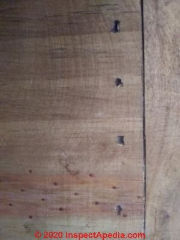
On 2020-04-15 - by (mod) - modern spring latch found on antique pine armoire?
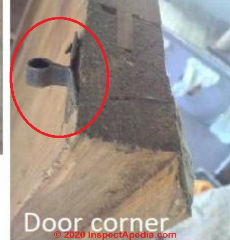
The most unusual detail is the clinched fasteners for hinges and handles rather than screws - an old hardware method - I'm researching further.
However the spring clip on the door corner is certainly a very modern type of catch - 20th century. If that catch is original this is not an antique.
The joinery is rough ("crude"in a word) at drawer corners.
I've seen work like this on modern reproduction furniture made offshore, but again ... the jury is out until I can see more detail and dig out the clinched hinge topic.
If you can get a sharp closeup of any other nails or fasteners that'd be helpful
Above is the modern spring clip catch detail - this is on the corner of one of the armoire doors.
below is the door corner joinery detail - are those dots nails? If so they look to me like power nailer fasteners. Power nailers, electric or pneumatic, firing finish type nails often shoot thin nails with small rectangular heads.
Also the drawer construction shows a face glued or nailed onto the rectangular construction of the drawer itself. In my OPINION this is a feature of very modern 20th or 21st century furniture, factory made, in which the final "finish" or "trim" of a piece can be selected later as a simple facing that is secured to a mass-produced carcase.
On 2020-04-15 by Barbara
My favorite part of this cabinet is how they made the shelf adjustable by moving the horizontal pieces of wood into the notches then sitting the shelf on top of it. I've never seen anything like that before.
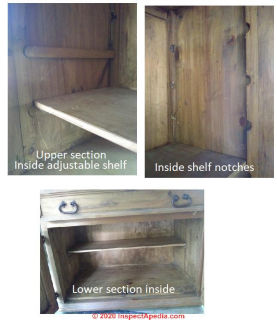
On 2020-04-15 by Barbara
Here are a few pictures of each handle and corners. Hoping it comes through with multiple pictures on one attachment. Thank you so much for your help with this. Means a lot :)
[Click to enlarge any image]
On 2020-04-15 - by (mod) - On a "possibly-antique" armoire, look at the wood joinery - edges of doors and that drawer & nails or screws to guess age of the furniture
Let's take a look at the wood joinery - edges of doors and that drawer
And take a look at the threads on the drawer or cabinet door interior at those handles
And take a look at all other fasteners, nails, screws we can see.
On 2020-04-15 by Barbara
This is the cabinet it is on. It's a cabinet that was given to me by someone that knew nothing if it's history. It just looks awful old to me so I thought I'd ask :) It's 6 feet tall and 42 inches wide.
On 2020-04-15 - by (mod) - how old is this hinge?
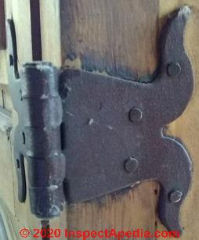
With nothing to lose except being foolish for guessing without a shred of surrounding data like country, city, furniture type, finishes, wood joint details, etc,
I'd say this is a modern hinge, at the very least, post 1900, from the thin metal work, absence of hand tooling marks, and number of hinge elements (5).
Knowing more about the furniture where the hinge is installed and seeing construction details can give us a more-accurate guess at the age of this door hinge.
[Click to enlarge any image]
On 2020-04-14 by Barbara
Could you tell me an approximate age of this hinge? Thank you. [shown above - Ed.]
[Click to enlarge any image]
On 2019-12-22 - by (mod) - how old is this wrought-iron door or gate latch
If your building is in North America then It could be older or the piece of Hardware could be a brand new reproduction but generally I've seen latches like that in homes and occasionally in Barns and other outbuildings from the mid-1800s.
Look for hammer marks or other signs that (even on modern reproductions) can suggest that this door hook was hand-wrought.
Wrought-iron latch hooks and gatehooks are still widely sold both as "antiques" but also as modern reproductions.
For clues that can help separate modern reproduction latchhooks from real antiques see
On 2019-12-21 by Anonymous
Wondering how old this latch is. [Shown above]
On 2018-12-19 - by (mod) - guessing at door knob age
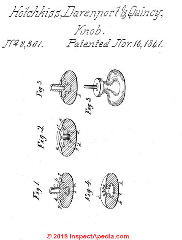 Thompson
Thompson
From just the door knob photo you provided I can but guess that if the knob and plate are not reproduction hardware than it was made before 1900.
In assessing the age of door hardware like hinges and knobs and locks it would be helpful to know
1. the country and city where the doorknob was installed
2. the age of the building where the door knob was installed
3. other clues and data regarding building age and history of modifications, additions, renovations.
That's because with just the doorknob itself we're a bit stuck. Popular patterns were produced over many decades.
Patent research can be informative if your doorknob is a U.S. product.
For example as early as the 1840's US Patents were recording improvements in cast brass door knob construction. Below I cite one of my favorite door knob patents that I like to call "the Three Johns Doorknob Patent of 1841"
- Hotchkiss, Davenport, & Quincy, DOOR KNOB MOUNTING [PDF] US Patent 2361, Nov. 16, 1841
This patent also describes construction of glass door knobs - an advancement. [Excerpt]
John G. Hotchkiss, of the city of New Haven and State of Connecticut, and John A. Davenport and John W. Quincy of the city of New York and State of New York, have invented a new and improved mode of securing metallic necks or shanks or screws to knobs of glass intended for door-knobs, curtaine pins, and such also as are used for cabinet-furniture or other purposes; and we do hereby declare that the following is a full and exact description thereof.
In forming the knob of glass, whether by blowing or by pressure, we leave a cavity in the back part of the knob where the neck, shank, or screw, is to be fastened such cavity being so made that by means of fusible metal, or alloy, poured into it, the neck, shank, screw, or other article prepared for the purpose, shall be securely held in place.
On 2018-12-19 by thompsonrocky454@gmail.com
How do you tell just how old your door knob is
IMAGE LOST by older version of Clark Van Oyen’s useful Comments code - now fixed. Please re-post the image if you can. Sorry. Mod.
...
Continue reading at NAILS, AGE & HISTORY or select a topic from the closely-related articles below, or see the complete ARTICLE INDEX.
Or see DOOR HARDWARE AGE FAQs - questions, answers, & photos discussing the age of doors and door hardware, posted originally on this page.
Or see these
Recommended Articles
- AGE of a BUILDING, HOW to DETERMINE
- CAULKS & SEALANTS, EXTERIOR
- CONDENSATION on WINDOWS, SKYLIGHTS
- DOORS, ENERGY EFFICIENCY
- DOORS, EXTERIOR FIBERGLASS vs STEEL
- DOORS, EXTERIOR, SELECT & INSTALL
- DOOR FLASHING DETAILS
- DOOR HARDWARE AGE
- DOORS, INTERIOR
- DOOR SOURCES
- NAILS, AGE & HISTORY
- SOUND CONTROL for DOORS
- SOURCES for DOORS & WINDOWS
- TRIM, EXTERIOR CHOICES, INSTALLATION
- TRIM, INTERIOR
- WINDOWS & DOORS, AGE, TYPES - home
- WINDOW HARDWARE AGE
Suggested citation for this web page
DOOR HARDWARE AGE at InspectApedia.com - online encyclopedia of building & environmental inspection, testing, diagnosis, repair, & problem prevention advice.
Or see this
INDEX to RELATED ARTICLES: ARTICLE INDEX to BUILDING AGE
Or use the SEARCH BOX found below to Ask a Question or Search InspectApedia
Or see
INDEX to RELATED ARTICLES: ARTICLE INDEX to DOORS & WINDOWS
Or use the SEARCH BOX found below to Ask a Question or Search InspectApedia
Ask a Question or Search InspectApedia
Try the search box just below, or if you prefer, post a question or comment in the Comments box below and we will respond promptly.
Search the InspectApedia website
Note: appearance of your Comment below may be delayed: if your comment contains an image, photograph, web link, or text that looks to the software as if it might be a web link, your posting will appear after it has been approved by a moderator. Apologies for the delay.
Only one image can be added per comment but you can post as many comments, and therefore images, as you like.
You will not receive a notification when a response to your question has been posted.
Please bookmark this page to make it easy for you to check back for our response.
IF above you see "Comment Form is loading comments..." then COMMENT BOX - countable.ca / bawkbox.com IS NOT WORKING.
In any case you are welcome to send an email directly to us at InspectApedia.com at editor@inspectApedia.com
We'll reply to you directly. Please help us help you by noting, in your email, the URL of the InspectApedia page where you wanted to comment.
Citations & References
In addition to any citations in the article above, a full list is available on request.
- [1] Tremont Nail Company, P.O. Box 31, Mansfield, MA 02048, Tel: 800-835-0121, 508-339-4500 Website: http://www.tremontnail.com/
- America's Favorite Homes, mail-order catalogues as a guide to popular early 20th-century houses, Robert Schweitzer, Michael W.R. Davis, 1990, Wayne State University Press ISBN 0814320066 (may be available from Wayne State University Press)
- American Plywood Association, APA, "Portland Manufacturing Company, No. 1, a series of monographs on the history of plywood manufacturing",Plywood Pioneers Association, 31 March, 1967, www.apawood.org
- "An Example of Colonial Paneling", Norman Morrison Isham, The Metropolitan Museum of Art Bulletin, Vol. 6, No. 5 (May, 1911), pp. 112-116, available by JSTOR.
- Pergo AB, division of Perstorp AB, is a Swedish manufacturer or modern laminate flooring products. Information about the U.S. company can be found at http://www.pergo.com where we obtained historical data used in our discussion of the age of flooring materials in buildings.
- The Stairway Manufacturers' Association, (877) 500-5759, provides a pictorial guide to the stair and railing portion of the International Residential Code. [copy on file as http://www.stairways.org/pdf/2006%20Stair%20IRC%20SCREEN.pdf ] -
- The Staircase, Ann Rinaldi
- What Style Is It?: A Guide to American Architecture, Rev., John C. Poppeliers, S. Allen Chambers, Wiley; Rev Sub edition (October 6, 2003), ISBN-10: 0471250368, ISBN-13: 978-0471250364
- Our recommended books about building & mechanical systems design, inspection, problem diagnosis, and repair, and about indoor environment and IAQ testing, diagnosis, and cleanup are at the InspectAPedia Bookstore. Also see our Book Reviews - InspectAPedia.
- In addition to citations & references found in this article, see the research citations given at the end of the related articles found at our suggested
CONTINUE READING or RECOMMENDED ARTICLES.
- Carson, Dunlop & Associates Ltd., 120 Carlton Street Suite 407, Toronto ON M5A 4K2. Tel: (416) 964-9415 1-800-268-7070 Email: info@carsondunlop.com. Alan Carson is a past president of ASHI, the American Society of Home Inspectors.
Thanks to Alan Carson and Bob Dunlop, for permission for InspectAPedia to use text excerpts from The HOME REFERENCE BOOK - the Encyclopedia of Homes and to use illustrations from The ILLUSTRATED HOME .
Carson Dunlop Associates provides extensive home inspection education and report writing material. In gratitude we provide links to tsome Carson Dunlop Associates products and services.


